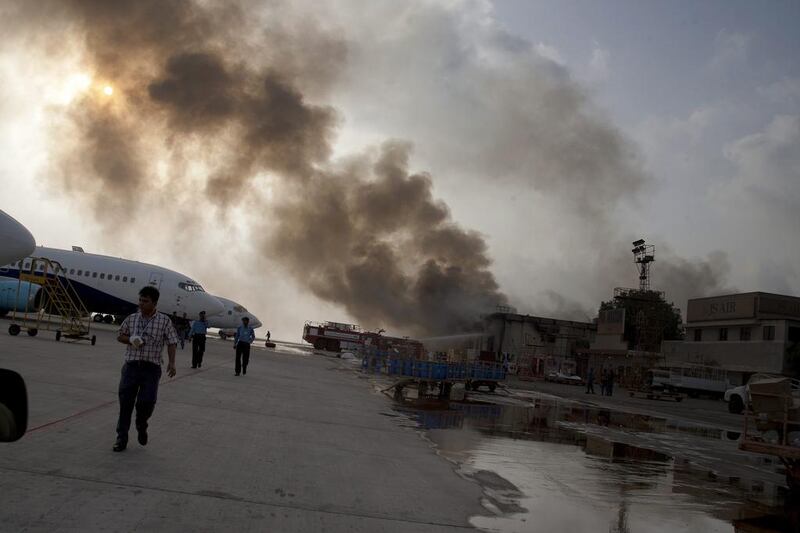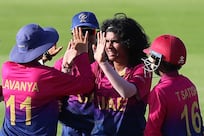Taimur Khan and Raza Khan
KARACHI // An audacious terrorist attack against Pakistan’s largest international airport appeared to be over after security officials said they killed the last militants who stormed onto the tarmac on Sunday night, leaving 28 dead and freezing operations.
Military officials had announced that by 5am local time on Monday the attackers were dead and normal operations at Karachi's Jinnah International Airport would resume. But as the sun rose over the beleaguered city of 20 million an explosion and gunfire were heard once again at the still smouldering terminal.
The Pakistani Taliban claimed responsibility for the hours-long attack that killed security personnel, Pakistani airline workers and at least 10 militants.
“We carried out this attack on the Karachi airport and it is a message to the Pakistan government that we are still alive to react over the killings of innocent people in bomb attacks on their villages,” Shahidullah Shahid, a Tehrik-e-Taliban Pakistan (TTP) spokesman, told Reuters, referring to recent military air strikes in the North Waziristan tribal area where an assortment of Islamist groups fighting to overthrow the Pakistani government are based.
According to security officials and witnesses, at least a dozen militants wearing Airport Security Force (ASF) and Pakistani International Airline uniforms, and armed with automatic weapons, grenade launchers and suicide vests, made it through security checkpoints at the airport’s old terminal, about 1.5km from the main airport facilities. The terminal is normally used by VIPs including the Prime Minister and President of Pakistan, cargo and Haj pilgrims.
Once inside, the attackers stormed onto a nearby runway, lobbing grenades and salvos of gunfire at security officers.
“They came from the fuelling area and started indiscriminate firing,” said an airport employee who said he fled and hid in a nearby building in the chaos of the initial attack. “They were dressed like us”, and as the ASF exchanged fire “there was heavy firing from both sides”. The security officers were initially confused by the militants’ uniforms, but their long, unkempt beards eventually made it possible for some of them to be distinguished, the worker said, requesting anonymity to discuss what he saw.
Local news channels showed footage of a huge fire very close to three parked passenger jets that came from a fuel depot set alight during the firefight, said Karachi police chief Ghulam Qadir Thebo. He added that no aircraft had been damaged in the attack.
Everyone in the main terminal of the airport was safe, Maj Gen Asim Bajwa, an army spokesman, also said.
An Emirates Airline flight due to take off for Dubai was on the tarmac at the time of the attack and had to be evacuated by Pakistani military.
“Under the guidance of the Pakistan Military the passengers and crew disembarked the aircraft and were taken to a secure area of the terminal,” an Emirates spokesman said. “When the airport reopens all passengers will be rebooked on to alternate Emirates flights to continue their journey.”
According to the Pakistan Civil Aviation Authority website, two other international flights were scheduled to depart Jinnah International between 10.30pm and 1am, bound for Sharjah and Bangkok.
All Karachi-bound flights were diverted and flight operations remained closed on Monday.
Flights between the UAE and Karachi, including from Dubai and Abu Dhabi were among those delayed.
An Etihad Airways spokesman said they were continuing to monitor the security situation in Karachi.
An anonymous Pakistani intelligence official told the Washington Post that some of the attackers had tried to hijack a plane, but had been fought off. Gen Bajwa denied that the gunmen had attempted a hijacking.
At Jinnah Hospital, the city’s largest government-run medical centre, ambulances rushed the injured and dead to the emergency room and morgue.
At least 16 people had been critically injured, according to Dr Seemin Jamali, a hospital official, and security officials were working to identify the dead bodies, a task made more difficult by the common uniforms worn by both officers and terrorists.
Amid the sickly smell of burnt flesh, blood and explosives, over 12 bodies lay on white marble slabs in the darkened morgue on Monday morning, with officials using lights on their mobile phones to inspect the corpses due to an electricity blackout.
Officials suspected two of the dead were militants. “This one is suspicious,” Assistant Superintendent Sayed Salman, said, gesturing to a body wearing the black T-shirt and blue camouflage trousers of the ASF. Most of the right side of his abdomen was missing due to an explosion, and he wore a long beard and carried a blank PIA identification card.
The airport assault comes after nascent peace talks between Prime Minister Nawaz Sharif’s government and the TTP that began in February likely fell apart permanently in recent weeks, as the Pakistani military renewed air strikes against TTP sanctuaries in North Waziristan that are also home to Uzbek and Chinese Uighur fighters.
The military, which opposed the talks bid, had signalled it was running out of patience with the government’s approach as TTP attacks, including one on a military complex near Islamabad last week, continued during the declared ceasefire.
Disagreements among TTP factions over the negotiations also erupted into open warfare last month, scuttling the talks, but also weakening the group. Mehsud tribal factions loyal to the Afghanistan-based TTP emir Mullah Fazlullah oppose negotiations, while groups allied with a militant commander known as Sajna support talks.
The latter is also backed by the Afghan Taliban Haqqani network, which would rather the TTP focus its resources on fighting American forces in Afghanistan rather than attack Pakistani cities. Pakistan’s intelligence agency, the ISI, is also fostering the militant divisions, and is backing the Sajna group in its fight against Fazlullah in North Waziristan, where TTP leaders have been killed in drive by shootings in recent weeks, and in Karachi, said Arif Rafiq, an analyst with the Middle East Institute think tank.
The airport attack could be a show of strength by Fazlullah’s group and “signal that the TTP has not changed and that it continues to maintain its relevance”, Mr Rafiq said.
“The question”, he added, “is will the Pakistani civilian and military leadership be able to develop a cohesive strategy to target the TTP and other groups in the longer term.”
So far the answer is negative, as the powerful military continues to clash with the elected government over how to tackle the militants. Mr Sharif has preferred to engage in doomed talks and defer difficult decisions that could spark more attacks, while the military and ISI continue their strategy of backing some militant groups as proxies in Afghanistan and against India.
The military cannot launch an all-out offensive on North Waziristan without the government’s approval, but it is likely to escalate air strikes and ground assaults in the short term, while the “shadow war” conducted by the ISI continues, Mr Rafiq said. For the core TTP, “the restraint is now gone”.
Geopolitical dynamics are also a factor in the terrorist attacks, as India, Pakistan and Afghanistan position themselves for the withdrawal of most US forces from Afghanistan later this year.
Afghanistan’s intelligence service, the National Directorate of Security, provide support to Fazlullah’s TTP faction to counter Pakistani support for the Haqqani Taliban and to direct militant groups toward Pakistan after the US security presence in Afghanistan recedes.
“There is definitely a tit for tat going on in the region,” Mr Rafiq said.
tkhan@thenational.ae





